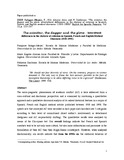The scimitar, the dagger and the glove: intercultural differences in the rhetoric of criticism in Spanish, French and English medical discourse (1930-1995)

Voir/
Date
2003Palabras Clave
Medical english, French and spanish, Academic criticism, Historical studies, Contrastive rhetoricMetadatos
Afficher la notice complèteRésumé
The socio-pragmatic phenomenon of academic conflict (AC) is here addressed from a
cross-cultural and diachronic perspective, and is examined by combining a quantitative
approach and a qualitative discoursal analysis of its salient rhetorical features in a corpus of Spanish, French and English medical articles published between 1930 and 1995. The
speech acts that conveyed AC were recorded in each paper and classified into 2 categories
according to their level of commitment (direct author’s involvement) or detachment
(hedginess and AC responsibility shifting). The quantitative results were analyzed by
means of the Chi-square test. Our overall findings indicate that French and Spanish
scientists tend to be not only more critical, but also more authoritarian and passionate in the formulation of their AC than their Anglo-Saxon counterparts. However, when analyzed
diachronically, our results indicate that from the 1990s on, the rhetorical behavior of
Spanish AC (though still somewhat blunt and personal) quite abruptly distinguishes itself
from that of French and starts adopting the more veiled and “politically correct” tone of
English AC. By contrast, the discursive pattern of French AC did not substantially change
over time, although its indirectness slowly and continuously increased over the period
studied. By placing the above results within their broader educational, political, historical and socio-economic context, it can be claimed that the behavioral changes observed in the framing of AC reflect the evolution of an increasingly promotional, competitive, professionalized, collegial and pragmatic end-of-20th-century scientific research which tends to compel scientists to progressively change their vision of science, although certain cultures seem to be more vulnerable to external penetration than others.
Información Adicional
| Correo Electrónico | frmeyer@cantv.net ariza@ua.es nzambrano@ula.ve |
| Editor | English for Specific Purposes. Vol. 22, p. 223-247 |
| Colación | 223-247 |
| Institución | Universidad de Los Andes |





